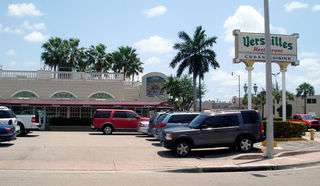Versailles restaurant

Versailles Restaurant (commonly referred to as simply Versailles), cafeteria, restaurant, and bakery, is a landmark eating establishment located on Calle Ocho (8th St) in Little Havana, Miami. The large restaurant seats 370 people and has ornate etched glass and statuettes and features a bakery, a takeout area, a counter window and the ability to host banquets and parties.[1][2] Founded by Felipe A. Valls, Sr. (from Santiago de Cuba) in 1971, Versailles is a popular restaurant among local Cuban exiles and tourists for its Cuban cuisine and connection to anti-Castro politics.
Gastronomical significance
Versailles is a popular place for Cuban food and social gathering in Miami, serving "cafecito", "cortadito", Cuban pastries (beef or guava), and "croquetas" at a walk-up window.[3]
In its main dining room, the restaurant also serves dishes including Moros, palomilla steaks (Cuban minute steak), maduros, tasajo, croquetas de yuca, tamal en cazuela, and milanesa. There is an adjacent bakery, a take-out counter, and ample meeting space.[3]
Political significance

This is where (Cuban) exiles gather to plot against and to topple Fidel Castro (at least with words), or so the urban legend goes. This is where U.S. presidents, governors, legislators, mayors and commissioners come to court the Cuban vote and be photographed sipping that potent brew of café served by waitresses who call you by terms of endearment: "cariño", "hijo mío", "mi amor". This is where the nation’s television cameras converge to gauge Cuban-exile reaction when crooner Juanes is singing in Havana or militant Luis Posada Carriles is acquitted in Texas. This is where the media will surely be staged one day for The Big Party the day the tyrant (Fidel Castro) finally falls. Television networks have already reserved space around the restaurant to stage their live trucks here when The Day comes.
For decades, Versailles has been ground zero for the Cuban-American exile community in South Florida.[1] The restaurant has been a gathering point for anti-Castro protesters and the press wanting to cover their opinions.[4][5]
During Fidel Castro's hospitalization in August 2006, the news media set up a small tent city outside the restaurant in case news would break from the location.[6] Cuban-American politicians, including those from out-of-state like New Jersey Senator Robert Menendez, often hold fundraisers and rallies at the restaurant.[7]
References
- 1 2 3 Versailles: 40 years serving food with a side of politics by Fabiola Santiago, The Miami Herald, July 10, 2011
- ↑ Eric Asimov, Choice Tables; A Fresh Breeze Sweeps Miami's Restaurant Scene, The New York Times, January 16, 2000.
- 1 2 http://3guysfrommiami.com/versailles.html
- ↑ Kirk Semple, For Cubans in U.S., Views Have Evolved, The New York Times, February 20, 2008.
- ↑ "Versailles in Frommers Guide".
- ↑ David Gonzales, From Miami, News Agency Fields Reports From Cuba, The New York Times, August 4, 2006.
- ↑ David W. Chen, Menendez Plays to His Base, in South Florida, The New York Times, September 28, 2006.
External links
- BBC: "Billing itself as 'Miami's most popular Cuban restaurant since 1971', ... "
- Miami Herald: "... Versailles, the unofficial town square of el exilio ... "
- Miami Herald: Little Havana's Versailles is more than a restaurant.
Coordinates: 25°45′54″N 80°15′09″W / 25.765066°N 80.252608°W